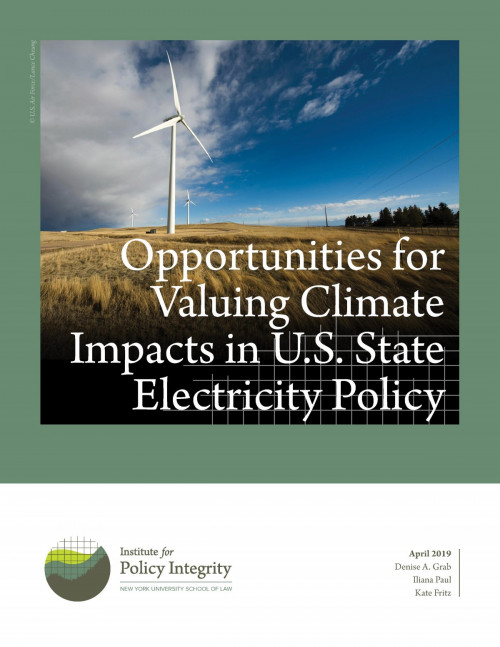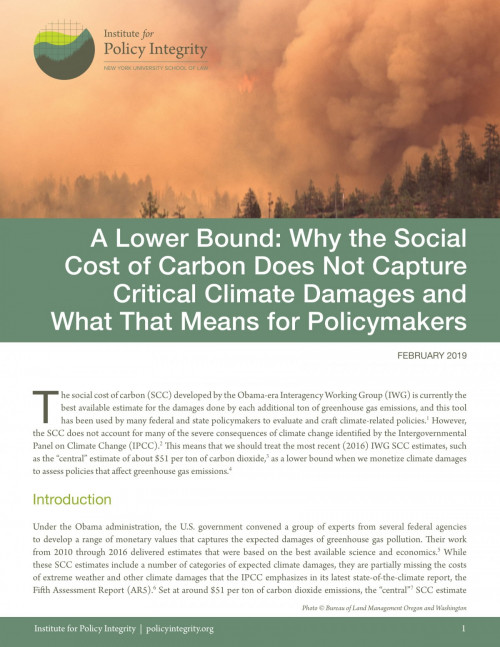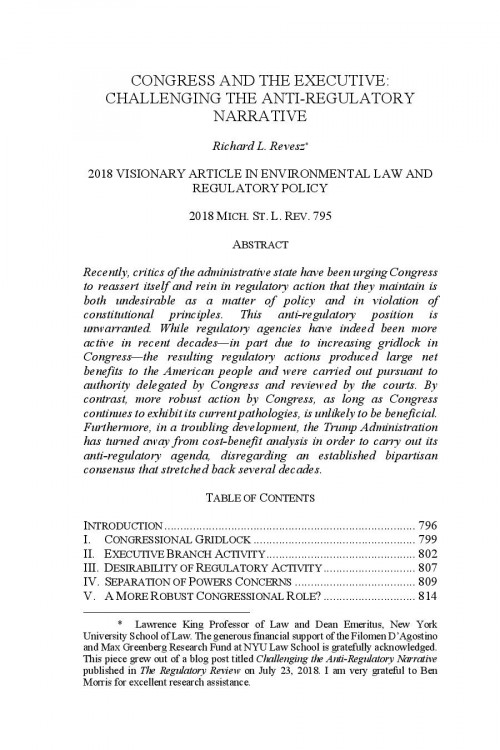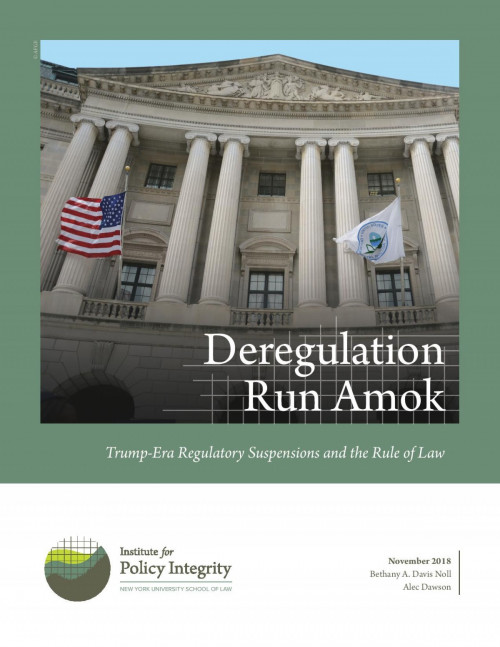-

Opportunities for Valuing Climate Impacts in U.S. State Electricity Policy
With an absence of federal leadership on climate change, many states have worked to reduce greenhouse gas emissions on their own, often by incorporating a broader range of considerations into electricity policy. Our report assesses the potential to expand the valuation of climate damages in state electricity policy using Social Cost of Carbon metrics. We examine existing statutes and regulations in all 50 states to identify opportunities for valuing climate impacts around the country.
-

A Lower Bound
Why the Social Cost of Carbon Does Not Capture Critical Climate Damages and What That Means for Policymakers
The Social Cost of Carbon, developed by the Obama-era Interagency Working Group (IWG), is the best available tool for measuring the economic damages from greenhouse gas emissions. It has been used in analysis for over 100 federal regulations that affect greenhouse gas emissions, as well as by a number of states in electricity and climate policy. Still, many significant impacts identified by the Intergovernmental Panel on Climate Change are difficult to quantify and so have been omitted from the IWG SCC estimates. Impacts such as increased fire risk, slower economic growth, and large-scale migration are all unaccounted for, despite their potential to cause large economic losses. Our new issue brief discusses these omissions and other variables that will influence climate outcomes. We encourage policymakers to account for this likely underestimate by viewing the SCC as a lower bound for damages.
-

Congress and the Executive
Challenging the Anti-Regulatory Narrative
Critics of the administrative state have been urging Congress to rein in regulatory action, claiming that regulations created by executive agencies are undesirable as a matter of policy and are in violation of constitutional principles. In a troubling development, the Trump Administration has also turned away from cost-benefit analysis in order to carry out its anti-regulatory agenda, disregarding an established bipartisan consensus that stretched back several decades. This article, published in the Michigan State Law Review, argues that this anti-regulatory position is unwarranted. These executive regulatory actions produced large net benefits to the American people, were carried out pursuant to authority delegated by Congress, and were reviewed by the courts. By contrast, more robust action by Congress, as long as Congress continues to exhibit its current gridlock on important policy issues like climate change, is unlikely to be beneficial.
-
Roundup of Trump-Era Deregulation in the Courts
The Trump administration has undertaken numerous deregulatory actions through rule suspensions; repeals; rescissions; efforts to weaken regulations through guidance, memoranda, amendments, or replacements; and more. Many of these actions have been challenged in court and decisions have been reached in several cases.
The Institute for Policy Integrity maintains a publicly available list of the outcomes of those lawsuits. This “Roundup,” which we update regularly, has been cited by the New York Times, the Wall Street Journal, the Washington Post, Bloomberg, E&E News, and the Brookings Institution.
The Roundup provides an overview of each court decision, with relevant links to the government actions and court rulings. It also tallies the successful and unsuccessful outcomes for the administration for ease of reference. Updates should be submitted to [email protected].
-

Deregulation Run Amok
Trump-Era Regulatory Suspensions and the Rule of Law
Our report provides a survey of the legality of Trump Administration’s regulatory suspensions. Looking at a number of cases, we discuss the administration’s disregard for notice-and-comment requirements, statutory restrictions, and the reasoned explanation requirement. We also lay out some of the challenges facing advocates, and the strategies by which agencies have evaded review.
-
Comments on Proposed Clean Power Plan Replacement
EPA recently issued a proposal to replace the Clean Power Plan (CPP) with a far weaker rule that will increase greenhouse gas and soot- and smog-forming emissions from the electric sector. Our comments explain why repealing the CPP is unnecessary, irrational, and harmful.
-
Comments on Proposed Weakening of Vehicle Emissions Standards
In August 2018, the Trump administration issued a proposal to dramatically weaken federal emissions standards for cars and light trucks, and to revoke the waiver that allows California to set its own standards. Federal emissions standards have been enormously successful at reducing greenhouse gas pollution and lowering fuel costs for consumers, and we recently submitted five separate sets of comments detailing the flaws with the Trump administration’s proposal.
-
Comments to EPA on Increasing Transparency in Cost-Benefit Analysis
Claiming an unsubstantiated need to improve consistency and transparency in its economic analyses, the Environmental Protection Agency (EPA) is considering revisions to how it weighs costs and benefits in rulemakings. In our comments to EPA, we argue that this proposal is searching for a problem that does not exist. In implying that the agency’s past analyses have somehow inappropriately considered costs and benefits, EPA relies on vague or false assumptions and misleading examples. In fact, through 2016, EPA’s past analyses of regulatory costs and benefits were among the most thorough, consistent, and transparent regulatory impact analyses conducted in the federal government and had justified some of the most net beneficial rules in the history of federal regulation.
-
Comments to Interior on Offshore Oil Well Control Revisions
After the Deepwater Horizon explosion and oil spill, the Department of the Interior’s Bureau of Safety and Environmental Enforcement (BSEE) issued regulations designed to improve the safety of offshore drilling operations. Finalized in 2016 after six years of extensive public involvement, these safeguards are now in the process of being rolled back by BSEE. Our comments to BSEE argue that it should not move forward with its notice of intent to repeal and/or modify the Blowout Preventer Systems and Well Control Rule, because BSEE has not provided a reasoned explanation for weakening and repealing safety requirements that it found necessary in 2016. BSEE must analyze all of the forgone societal benefits from rolling back the finalized safeguards, including safety and environmental risk reduction, time savings, industry cost savings, reduced fatalities, and lower externality costs.
-
Comments on FERC’s NOI on the Certification of Interstate Natural Gas Pipeline Facilities
In April 2018, the Federal Energy Regulatory Commission (FERC) issued a notice of inquiry on how to revise its policy on certifying the construction and operation of interstate natural gas transportation facilities. In the nineteen years since FERC’s existing policy statement was released, there have been significant advances in the understanding and measurement of climate change and other environmental effects of natural gas production, transportation, and consumption. Our comments suggest clarifications and improvements to FERC’s NEPA and Natural Gas Act analyses that will better inform policymakers and the public about the environmental effects of proposed projects. We also submitted joint comments on the appropriate use of the social cost of carbon in the interstate natural gas facilities certification processes, including why and how greenhouse gas emissions should be monetized in FERC’s NEPA and Natural Gas Act analyses.
Viewing recent projects in Government Transparency






